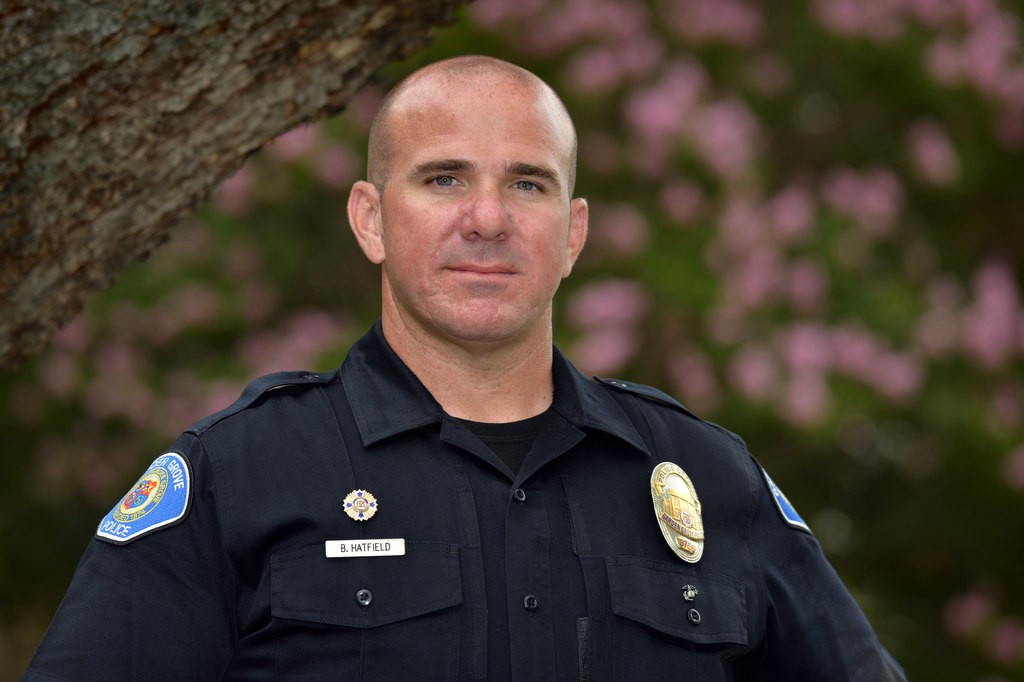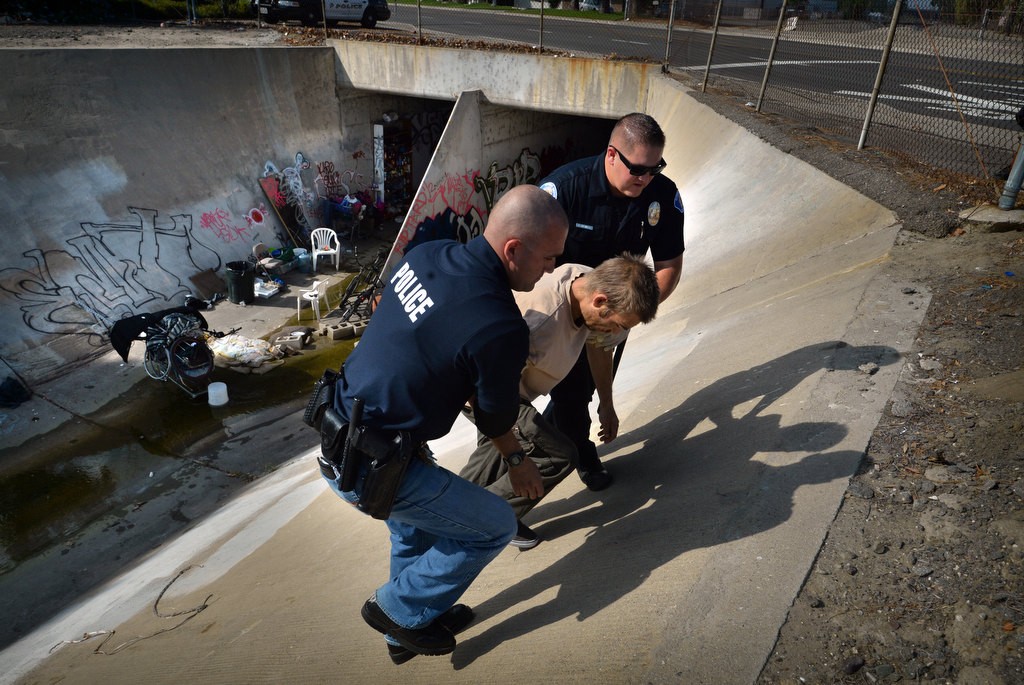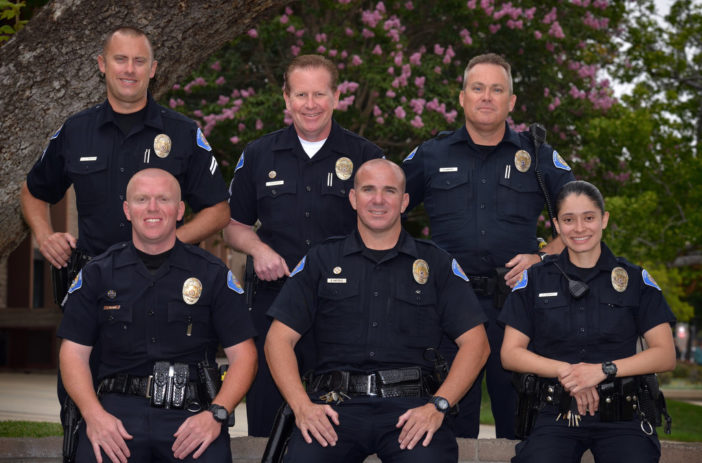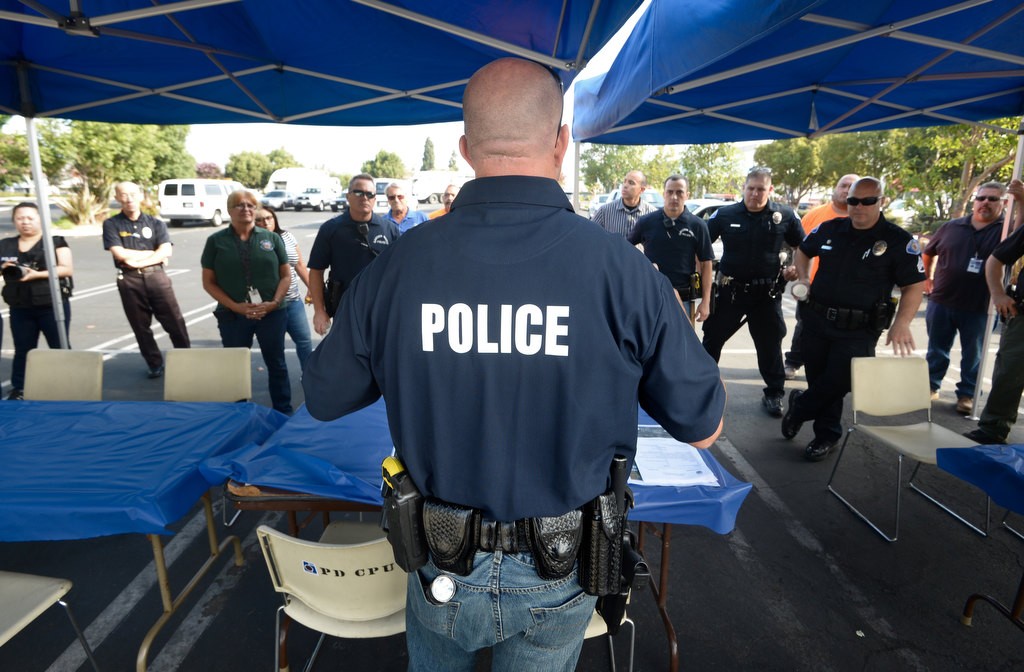Garden Grove Police Officer Brian Hatfield began his efforts into assisting the city’s homeless and mentally ill populations by accident – literally.
He was off work for nearly four months after suffering a serious cycling accident while training for a triathlon. While helping out a homeless outreach group through his church, he saw the immense need in the community.
“I quickly realized that a lot of the people, especially in the homeless population, didn’t realize the number of resources that are out there,” says Hatfield, who now heads up a five-person Special Resources Team, charged with connecting the local homeless and mentally ill populations with appropriate resources to help reduce their numbers on the streets.
According to the GGPD, calls involving the homeless went up by more than 40 percent in 2015 from the previous year.
Before his accident, Hatfield had been noticing a crime trend in Garden Grove’s industrial area – petty theft, smashed windows, etc. He found many items from the thefts down in an underground homeless community in the flood control channels.
By the time he returned to work, he knew what he had to do. In January 2015, he began making contacts in order to build a resource database, because he understood enforcement isn’t always the answer in these situations. From his experience of helping the homeless through his church, he knew that sometimes people just need to know what is available to them.

Garden Grove PD Officer Brian Hatfield, who spearheaded the Special Resources Team at GGPD.
Photo by Steven Georges/Behind the Badge OC
Though the SRT only officially launched in May, it has actually been conducting outreach in the homeless and mentally ill populations for the past six months.
Since Hatfield knew the flood control channels had high homeless populations, he organized some outreach resource drives in these areas. In August 2015, he invited organizations out to the flood control channel at Knott Street and Garden Grove Boulevard. The team was able to get two women into shelters, one veteran connected with a veteran’s group in Long Beach and one man into drug rehabilitation.
Though he continues organizing these drives – including a large one coming up on July 30 at Beach Boulevard – he realized that because of the effort and time it takes to organize them, it couldn’t be the only form of contact with these populations. So he and the team also work closely with the Orange County Outreach and Engagement Team through the county. The OCOET is a mental health group for underserved populations. Plus, the team also has a full-time clinician from Orange County Mental Health, since the mentally ill are a large part of the populations they serve.
“I wanted to steer clear of the word ‘homeless’ [in the team’s name]because Garden Grove has a very diverse community,” he says, “in that there are certain situations where a person is housed … yet suffers from mental illness of some type.”
In addition to assisting in special projects, the SRT also makes sure there is follow-up on cases where there is repeated police response regarding the homeless or mentally ill.

In this file photo, Garden Grove PD officers help a homeless man living in a flood canal under Western Avenue up the steep embankment as the Garden Grove Homeless Task Force conducts a cleanup sweep.
File photo by Steven Georges/Behind the Badge OC
“A lot of people, especially in the homeless or low-income community, can’t afford the medication, so they self-medicate [with]alcohol or drugs,” says Hatfield.
The SRT provides training every two months to officers on patrol in handling mental health and homeless calls. Part of the training includes appropriate responses to transient calls, how to legally and appropriately handle property when an arrest is made and verbal techniques to help de-escalate a situation. Patrol officers also learn about the different types of mental illness they might encounter.
“It’s wonderful and great if I have all the experience and tools in my bag, but it does nothing for my partners if I don’t share any of that information,” Hatfield says.
Since SRT members all have full-time assignments – for instance, Hatfield is a full-time patrol officer in the west division – their work is done outside of their regular duties. When Hatfield clears his calls, he’ll pay a visit to the homeless encampments or follow up on some mental health calls.
“If we can prevent somebody to lay their head on a sidewalk in the city, I’ll take 20 minutes out of my day to help that person,” he says.

In this file photo, Candice Mello, a homeless woman who has been living in the flood canal under Western Avenue for a fews months, gives her dog Spaz a hug while she talks to health care professionals about her options. File photo by Steven Georges/Behind the Badge OC
The program is close to Hatfield’s heart, because – even though this happened by accident – it wasn’t an unfamiliar topic in his life. He grew up with family members who had mental health problems and also had a family member who was homeless.
Now with the SRT, he’s able to help others get some of those resources they need.
“You give a man a fish, he can eat for a day. If you teach a man to fish, he can eat for a lifetime,” he says.
 Behind the Badge
Behind the Badge





